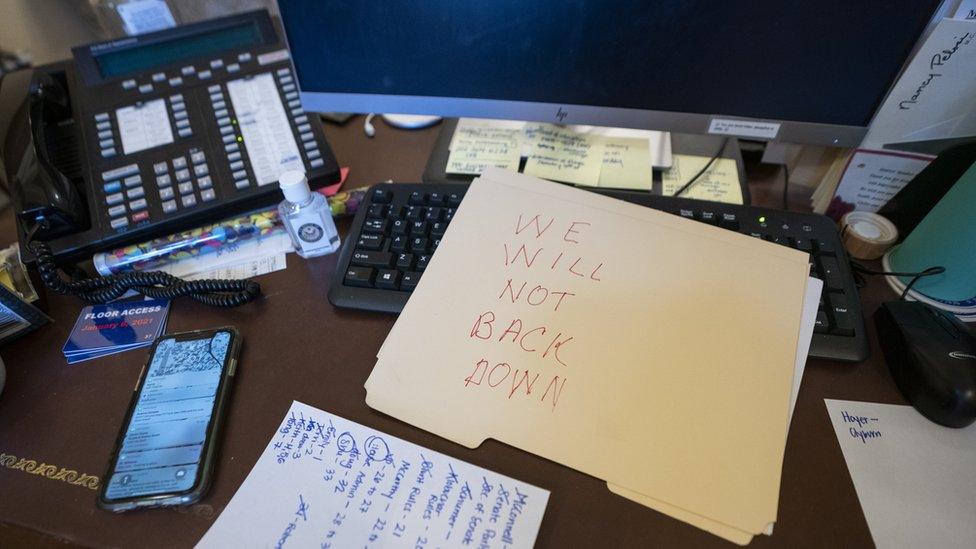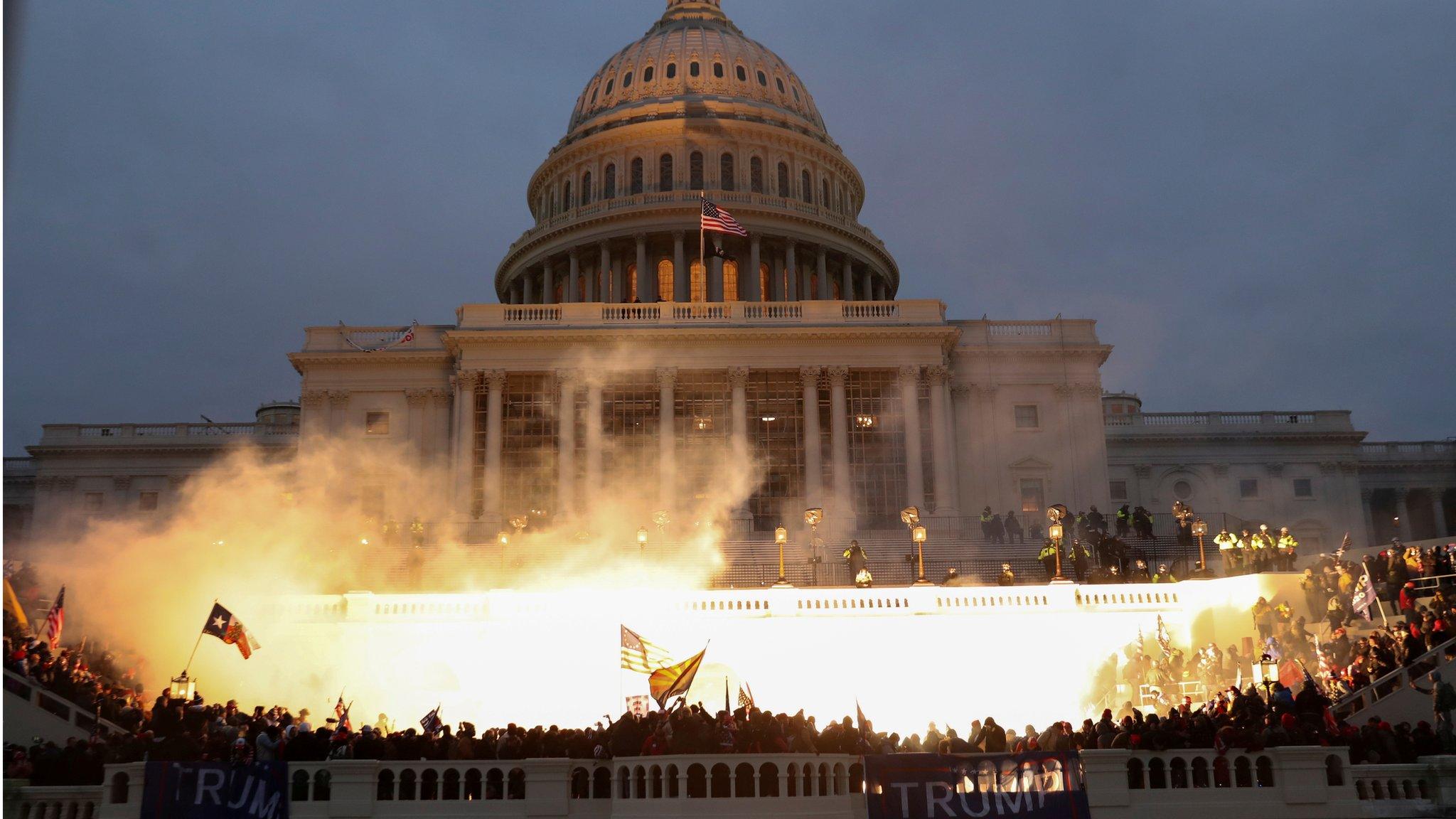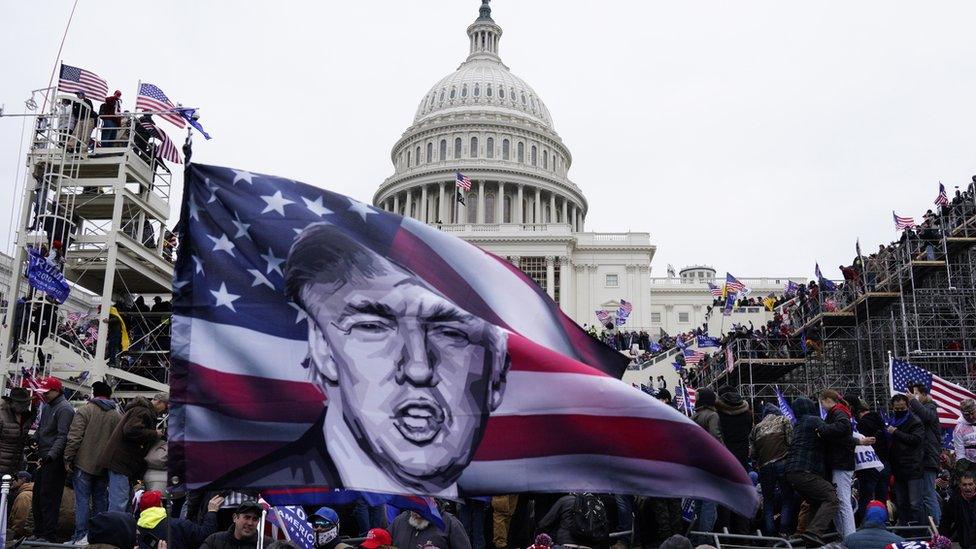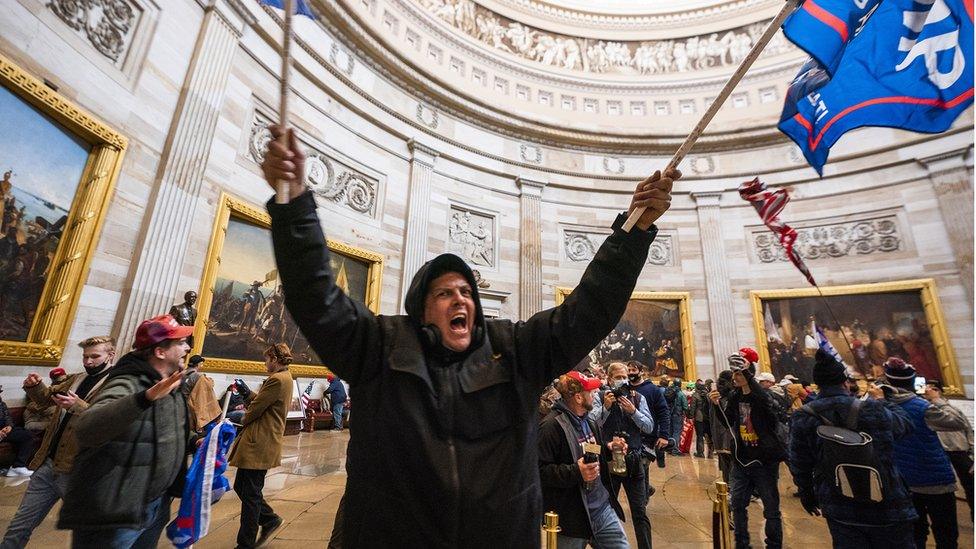Capitol siege: Trump's words 'directly led' to violence, Patel says
- Published
Priti Patel says Donald Trump was wrong for not condemning the violence
Donald Trump's comments "directly led" to his supporters storming Congress and clashing with police, Home Secretary Priti Patel has said.
Four people have died after a pro-Trump mob stormed the building in a bid to overturn the election result.
President Trump had urged protesters to march on the Capitol after making false claims of electoral fraud.
Ms Patel said the president's words had fuelled the violence and he "didn't do anything to de-escalate that".
Prime Minister Boris Johnson has condemned the "disgraceful scenes" and called for a "peaceful and orderly transfer of power".
On Wednesday evening, President Trump later called on his supporters to "go home", while continuing to make false claims of electoral fraud.
He has been suspended from his Facebook and Instagram accounts for at least two weeks, and possibly indefinitely. Twitter has also frozen his account.
The president has now said there will be an "orderly transition" to Democrat Joe Biden, whose November election victory has now been certified by US lawmakers.
But he added that he continued to "totally disagree" with the outcome of the vote, repeating his unsubstantiated claims of electoral fraud.
'Awful beyond words'
Hundreds of the president's supporters stormed the Capitol - where lawmakers were meeting to confirm Mr Biden's election victory - and staged an occupation of the building in Washington DC.
Both chambers of Congress were forced into recess, as protesters clashed with police and tear gas was released.
Ms Patel told BBC Breakfast the scenes were "awful beyond words".
The home secretary said: "His comments directly led to the violence, and so far he has failed to condemn that violence and that is completely wrong."
She added: "He basically has made a number of comments yesterday that helped to fuel that violence and he didn't actually do anything to de-escalate that whatsoever... what we've seen is completely unacceptable."
A woman died after being shot by police, and three others died as a result of "medical emergencies", local police said.
Politicians across the UK's political parties lined up to condemn the scenes in Washington.
Speaking on Thursday, Labour leader Sir Keir Starmer said Mr Trump should "take responsibility" for what happened, calling it the "culmination of years of the politics of hate and division".
Sir Keir added he welcomed the outgoing president's agreement to an orderly handover, but told reporters "he should have said it a long time ago."
'Rule of the mob'
Scottish First Minister Nicola Sturgeon said Mr Trump had been "inciting insurrection in his own country," and called it a "dark period" in US history.
"What we witnessed last night is not that surprising. In some senses, Donald Trump's presidency has been moving towards this moment almost from the moment it started," she told ITV's Good Morning Britain.
Scotland's Justice Secretary Humza Yousaf said, external the home secretary should "give serious consideration" to denying Mr Trump entry to the UK after he leaves office.
Police place US Capitol Building on lockdown after Trump supporters breached security lines
Foreign Secretary Dominic Raab said certification of Mr Biden's victory was "good to see" after the "shocking events" on Wednesday, adding the UK condemned the violence "unequivocally".
Former Conservative Prime Minister Theresa May, who shared time in office with Mr Trump, said there should be "no place for the rule of the mob".
But senior Welsh Conservative Andrew RT Davies has been criticised after comparing the rioting to politicians who supported a second referendum on Brexit.
Mr Davies, a member of the Welsh Parliament, later tweeted that "violence must never be tolerated".
His party colleague, the Conservative MP Simon Hoare, suggested Mr Trump could be sent to the US detention centre at Guantanamo Bay:
Allow X content?
This article contains content provided by X. We ask for your permission before anything is loaded, as they may be using cookies and other technologies. You may want to read X’s cookie policy, external and privacy policy, external before accepting. To view this content choose ‘accept and continue’.

Friend of President Trump and leader of Reform UK - formerly the Brexit Party - Nigel Farage tweeted: "Storming Capitol Hill is wrong. The protesters must leave."
Meanwhile, Work and Pensions Secretary Therese Coffey has defended the prime minister's response to the rioting.
Asked on ITV's Peston programme why Mr Johnson hadn't criticised Mr Trump, she said: "The prime minister has been clear tonight that we need a peaceful and orderly transition."
Commons Speaker Sir Lindsay Hoyle has written to express his "solidarity" with US House Speaker Nancy Pelosi, whose empty office was broken into by protesters.
"Seeing your office trashed in that way and its occupation by one of the rioters was particularly outrageous. I am just so relieved you were not hurt," he wrote.

Trump supporters left this note on the desk of Nancy Pelosi, the Speaker of the House of Representatives.

It is a truism of British diplomacy that every occupant of 10 Downing Street has to get on with every occupant of 1600 Pennsylvania Avenue, regardless of their politics or character.
Personal consideration is pushed aside. What matters is the national interest and staying close to one of Britain's closest allies.
Thus even now, even after Donald Trump's incitement of the Capitol mob, even though there are less than two weeks until the inauguration, even as close Republican allies jump ship, Boris Johnson and Dominic Raab were reluctant to criticise the president by name in their initial response overnight.
Yes, they condemned the violence. But of Mr Trump, not a word. This caution was matched by the Prime Ministers of fellow so-called Five Eyes intelligence allies, Australia and New Zealand, both of whom also both failed to mention Mr Trump in their condemnatory tweets.
In contrast, European leaders were quick to blame the president personally.
It was only this morning that a British minister, Home Secretary Priti Patel, felt able to follow suit in strong terms.
So was this natural and sensible diplomatic caution in the midst of a febrile crisis?
Or was this, as some Labour figures are already claiming, a function of the closeness between the current UK government and the Trump administration?
It was only a few weeks ago that Defence Secretary Ben Wallace told The Sun, external that he would miss Donald Trump because he was a good friend to Britain.
Whatever one's views, it is certainly the case that the British government is seen on the international stage by some has having ideological proximity to Mr Trump.
Changing that reputation is seen by many diplomats as a priority in the months ahead, a task made more urgent by events overnight.
- Published7 January 2021

- Published7 January 2021

- Published6 January 2021
